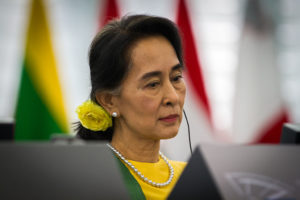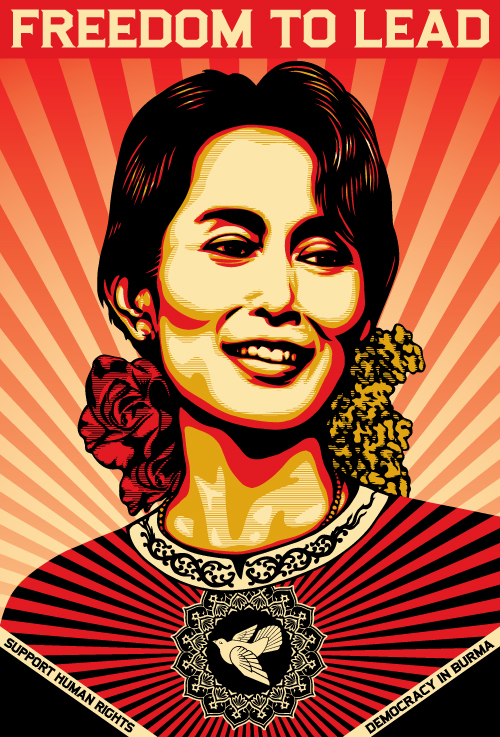Aung San Suu Kyi: Fallen Hero
 Burmese leader Aung San Suu Kyi in 2013 (photo by Claude Truong-Ngoc)
Burmese leader Aung San Suu Kyi in 2013 (photo by Claude Truong-Ngoc) As a lifelong political nerd, most of my personal heroes have been politicians and political theorists. And while many of these figures have retained a place in my heart, one of them has shocked me and the greater human rights community with her apparent betrayal of the humanitarian values she was once renowned for.
Aung San Suu Kyi is the first state counsellor (essentially prime minister) of Burma (or Myanmar, depending on your politics) and is a former political prisoner. Held under house arrest for roughly fifteen years during a twenty-one-year period by the military government for being a threat to the stability of their dictatorship, and for publicly speaking out against the numerous human rights violations committed by that government, she was known internationally as a Nelson Mandela-like figure who fought against a repressive government.
I personally held this view of Suu Kyi during my college years and those immediately following graduation; I attended rallies and marches organized to promote her release and ability to democratically assume power. A popular poster made in her honor featuring her image and the slogans: “Freedom To Lead,” “Support Human Rights,” and “Democracy in Burma,” was proudly displayed in my bedroom and was the first thing I saw when I woke up in the morning. Her face reminded me of the struggle that millions of people around the world endure every day in their fight for democracy and the basic human rights that all people deserve.
And when the military government finally ceded power to her (while preventing her from fully achieving power by limiting her ability to hold top positions and ensuring that the military would have guaranteed seats in the legislature), I was hopeful that things would improve for the people of Burma.
And they did, at first. Burmese society began to open, foreign investments were made, and certain freedoms were restored. But the conflict with the Rohingya minority (a Muslim community which had experienced brutal oppression for years) continued to worsen and has badly deteriorated in recent months. Unfortunately, this has occurred under Suu Kyi’s watch, even if it did not happen as a direct result of any action taken by her.
As Shashank Bengali of the Los Angeles Times recently noted, “nearly half of Myanmar’s Rohingya Muslim population has fled the country in the past three weeks,” largely because of destructive military operations against the community in response to earlier conflicts between the community and state. As a result, Human Rights Watch has said that tens of thousands of homes across 214 villages have been destroyed.

The author’s (former) poster of Aung San Suu Kyi
Rather than attempting to restrain the military or resigning, Suu Kyi is alternating between denying the problem outright, stating she is investigating, and complaining that the international community is focusing on Burma’s problems rather than its attempts to open up to the world.
Essentially, in direct contradiction to her years of principled struggle against the repressive military rule, Suu Kyi is embracing, or at least enabling, a military that values stability over democracy and freedom, and which seeks to eliminate communities it sees as destabilizing or undesirable.
And while some progressives have rallied to defend her, Aung San Suu Kyi is being rightly lambasted by governments and humanitarian groups alike for her failure to publically recognize the atrocities being committed and for her failure to stop them (or to resign from her position if she is unable to do so).
While this situation is universally upsetting, it does create a teachable moment for humanists: never allow your heroes’ past accomplishments to protect them from criticism. As people who care about the rights of both ourselves and others, we must be uncompromising in holding those we trust to a high standard of behavior, even if doing so means opposing leaders that we once respected and emulated.
Gone is the poster from my bedroom. All that remains are the holes from the thumbtacks that supported it. Like many around the world, I can no longer call myself a supporter of Aung San Suu Kyi.
